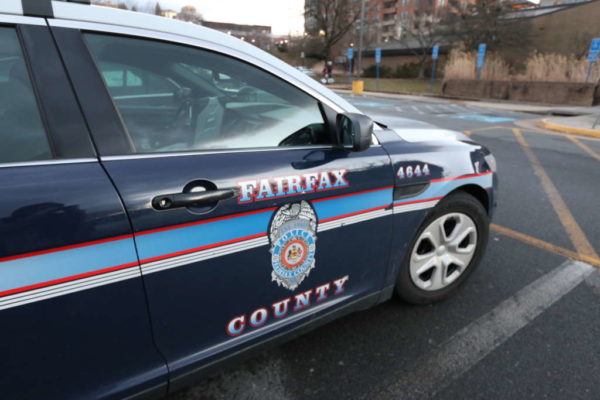A Reston man suffering from hallucinations fired several gunshots against imaginary kidnappers that he said were holding a child hostage in his town home.
The incident happened on May 7, according to court documents filed by the Fairfax County Police Department in Fairfax County Circuit Court.
A police officer arrived on the 1500 block of Poplar Grove Drive after the man told police kidnappers were holding a young child inside his townhome.
When an officer got to the scene, the man ran out of the home with a fully loaded gun, according to police. The officer handcuffed him and searched the townhome.
Police found no one in the home, but did spot two shell casings and evidence that two rounds were fired at a wall. No injuries or damages resulted.
The suspect was released on recognizance, after the man was held involuntarily “for his safety and the safety of the public” under a temporary detention order, according to the documents.
Police executed a search warrant to seize additional weapons from his home.
The suspect was arrested and charged with one misdemeanor count of the reckless handling of a firearm on Tuesday (May 21). He will be arraigned on May 28.
Reston Now does not publish the identity of suspects involved in cases with mental health implications.
File photo
 This is an opinion column by Del. Ken Plum, who represents Reston in Virginia’s House of Delegates. It does not reflect the opinion of Reston Now.
This is an opinion column by Del. Ken Plum, who represents Reston in Virginia’s House of Delegates. It does not reflect the opinion of Reston Now.
The message of Dr. Nadine Burke Harris to the 900 Virginia health, education, and human services professionals and advocates at the Voices for Virginia’s Children Summit on Childhood Trauma and Resilience last week was clear: Virginia, as well as other states, needs to move forward promptly on an evidence-based early human services program to screen for adverse childhood experiences and coordinate resources to respond to the needs. It was not a hard sell to the audience. They had already given her a lengthy standing ovation before she started her speech. Most knew of her pioneering work from her book, The Deepest Well: Healing the Long-Term Effects of Childhood Adversity, or her Ted Talk, “How Childhood Trauma Affects Health Across a Lifetime,” that has reached over 2.8 million viewers on www.ted.com/talks. She is known for linking adverse childhood experiences and toxic stress with harmful effects to health later on in life. She founded the Center for Youth Wellness and is California’s first Surgeon General.
According to Dr. Harris, exposure to adverse childhood experiences (ACE) including abuse, neglect, domestic violence and parental mental illness and substance abuse affect 34.8 million children across socio-economic lines and affect not only brain development but can change children’s hormonal systems, immune systems and even their DNA. The results are behavioral problems, learning difficulties and physical health issues. In adults, exposure to ACEs dramatically increases the likelihood of 7 out of 10 leading adult causes of death including heart disease and cancer.
For Dr. Harris early detection is key. Screening for ACEs in children is possible and with appropriate support services the existing and future harm to children’s brains and bodies caused by toxic stress can be alleviated. As Dr. Harris told the group in Richmond, “routine screening for ACEs at pediatric well-child visits should be as common as checking for hearing loss or exposure to lead paint. With early detection children can be treated and saved from a lifetime of health issues.”
Virginia currently has 19 communities throughout the state that have programs referred to as “trauma-informed community networks” that are at various stages of development of programs and services utilizing the findings of research on trauma and its impact on public health. There is little doubt that Dr. Harris’s visit will increase interest among practitioners and policy makers as to a more widespread use of the results of studies on ACEs. An effective program of ACE detection and intervention could lead to reduced health care costs, better performance of students in school, and a better quality of life for those involved. In the long-term, costs would be low or minimal as better diagnoses of conditions should lead to more effective treatments and a reduction in costs.
I look forward to working with Voices for Virginia’s Children–celebrating its 25th anniversary at the Summit–and its advocates to determine the most effective ways to make all programs trauma informed that will serve the entire Commonwealth. Such an approach will reduce the lingering harm that can come from undetected adverse childhood experiences.
File photo
Official Herndon Town Council results are in — Pradip Dhakal came in fifth place for the election, taking off Joe Plummer from one of the six candidates to take a seat on the council and sliding incumbent Bill McKenna to sixth place. [Reston Now]
Sharing mental health battles — Local first responders share their mental health battles in an effort to help others. [NBC 4]
Get your skates on — The Reston Town Center ice skating pavilion opens tomorrow at 11 a.m. for public ice skating and daily skate rentals. [Reston Town Center]
Herndon High School Theatre presents The Diary of Anne Frank — A performance of the play by Frances Goodrich and Albert Hackett begins tomorrow. Tickets are $5 for students and $10 for adults. [Herndon High School]
Photo by Tina
 This is an opinion column by Del. Ken Plum (D), who represents Reston in Virginia’s House of Delegates. It does not reflect the opinion of Reston Now.
This is an opinion column by Del. Ken Plum (D), who represents Reston in Virginia’s House of Delegates. It does not reflect the opinion of Reston Now.
The approval last week of Virginia’s expansion of Medicaid benefits to close the coverage gap for persons of low income without health insurance coverage was an historic event. After six years of opposition the General Assembly passed the necessary authorizing legislation to allow Governor Ralph Northam to go forward with federal authorities for approval of federal health benefits for as many as 400,000 Virginians with limited income making the Commonwealth the 33rd state to enter the program.
Approval of the program was part of a budget deal that completes the current budgetary year and authorizes funding for the entirety of state government for the next biennium. The expanded program will take effect on January 1, 2019. In addition, acceptance of the federal monies that have already been paid by Virginians through the taxes supporting the Affordable Care Act allows the new budget to free up some of the state monies that have been expended to meet the needs that will now be in the Medicaid program.
About $200 million will be used to raise teacher salaries, expansion of mental health and substance-abuse services, fund almost 1,700 additional waiver slots for those with intellectual or developmental disabilities and expand preschool and programs for at-risk students.
After such an historic action, where do we go from here? Much remains to be done in changing policies in the Commonwealth which while not necessarily budgetary will have an important impact on our communities. Among these are responding to the threats to life and safety brought about with the excessive number of guns that are too often in the hands of violent individuals. Passing common sense measures like universal background checks would make a difference as well as simple measures that keep guns out of the hands of children. Inaction on ending gun violence is not going to be tolerated by citizens much longer.
We have been making slow progress on a variety of mental health issues, but there is much that still needs to be done. One step is to separate those who are mentally ill from those who are criminal. Mixing the two together in local jails and prisons has been a too-common occurrence that serves only one effectively. Likewise, separating juvenile misbehavior from criminal behavior is necessary to reduce the prison population and recidivism and to stop the classroom to prison pipeline.
We need to speed up our movement from the use of fossil fuels to renewable energy sources. With the abdicating of responsibility for environmental matters by the federal government, we need to have a more active state presence to ensure that our air and water are clean. Also, we need to ensure that our laws, institutional practices, and norms do not promote or allow racism, sexism or other discriminatory practices directed towards others for whatever reason. We need to make sure that elected and appointed public officials comport to the highest ethical and moral standards.
That’s the short list. Where do you think we should go in state government building on the success of Medicaid expansion? Let me know your thoughts [email protected]. When we have clear goals and set our collective minds to the task we can get results. Expansion of Medicaid proves it!
File photo
 This is a commentary from Del. Ken Plum (D-Fairfax), who represents Reston in Virginia’s House of Delegates. It does not reflect the opinion of Reston Now.
This is a commentary from Del. Ken Plum (D-Fairfax), who represents Reston in Virginia’s House of Delegates. It does not reflect the opinion of Reston Now.
Virginia has the distinction of having had the first mental health hospital in the country, although it was called an insane asylum, which more correctly described the work it did.
From colonial days to the present, the role of the state in providing treatment and services for those with mental illness has been widely debated, filled with different theories and approaches, and always critically underfunded. It took a massacre of students at Virginia Tech and a state senator’s son attacking his father with a butcher knife, then shooting himself, to bring a higher level of urgency and seriousness to the discussion. A commission has been meeting the past couple of years and will continue to meet for at least a couple more to develop recommendations on what the state should do.
In the meantime, some hopeful progress is being made. After the Virginia Tech shootings, state appropriations for mental health programs were increased dramatically, only to be reduced again after the onset of the recession. Funding for programs for those with mental illness has been slowly increasing again but still does not come close to the levels requested by professionals in the field. Additional funding was provided in the most recent General Assembly session to allow for transitional housing. Statewide, there has been more clarification of the role of the Community Services Boards for the treatment of mental illness.
The practice of “streeting” persons, by putting them back on the street when there was no treatment option available to them, has largely been stopped. Emergency and temporary custody orders can be issued to ensure that those needing emergency care will receive it. Crisis treatment centers are being opened around the state.
We are blessed in Fairfax County that local government has for decades been offering mental health treatment and services well beyond that provided in most parts of the state. The most recent example is the Diversion First program, which just issued its first annual report. The program came about from the recognition that more than a quarter of the inmates in local jails have mental illness. They came into contact with law enforcement because of a behavior that needed treatment, not incarceration.
Sheriff Stacey Kincaid, the Fairfax County Police Department and the Community Services Board cooperatively put together a program that offers alternatives to incarceration for people with mental illness or developmental disabilities who come into contact with the criminal justice system for low-level offenses. As stated in their annual report, the goal is to intercede whenever possible to provide assessment, treatment or needed support in an appropriate setting for those who struggle with mental illness, developmental delays or substance abuse, instead of jail being the default solution. In its first year of work, the program diverted 375 persons from jail into treatment programs. Both money and lives are saved with the shift of emphasis.
More about this important new service made possible by Fairfax County government officials working together is available at www.fairfaxcounty.gov/DiversionFirst.
Afghan Immigrant Shares Story — Today, he works out of government service provider SOS International’s headquarters in Reston, where he lives with his family. A mere two years ago, Naveed was an interpreter in his home country helping with counter drug-dealing operations. While he says daily life in Afghanistan is not the harrowing experience Americans may imagine, he is happy to have his family safe in the U.S. [Fairfax Times]
Community Services Discussion Slated — The Fairfax-Falls Church Community Services Board says it is taking a “fresh look” at how it prioritizes mental health, substance abuse and developmental disability issues. The board wants to hear the opinions of citizens regarding what matters most to them and how they feel it should be handled. The board is hosting a series of community dialogues on the topic, the first of which is scheduled for Thursday, Feb. 16, at the Northwest Center in Reston. [Fairfax County]
Herndon Seeks Input on Proposed Budget — The Town of Herndon will host a public hearing Tuesday, Feb. 14, to discuss its FY2018 budget proposal. Comments may also be made online. [Town of Herndon]
 Last month, the disAbility Law Center (dLCV) issued a report on the condition of mental health services in Virginia. It is an eye-opening report: Broken Promises, the Failure of Mental Health Services in Virginia. (Broken Promises Report)
Last month, the disAbility Law Center (dLCV) issued a report on the condition of mental health services in Virginia. It is an eye-opening report: Broken Promises, the Failure of Mental Health Services in Virginia. (Broken Promises Report)
Its findings are direct: “Despite the promises of reform to the mental health service system in the last decade, Virginia’s mental health services system fails to serve many of those in need of its services.”
According to dLCV, there are more than 40,000 Virginians living with serious mental illness and thousands more with less serious emotional disorders that require treatment including an estimated 130,658 children between the ages of 9 and 18 who need treatment. The dLCV which advocates for all people with disabilities to be free from abuse, neglect, and discrimination considers the problem in part to be a misallocation of resources.
As its report points out, on any given month about 10 percent of residents of state hospitals continue to be hospitalized even though their treating professionals have found that they no longer need to be hospitalized. Thirty-one of the 133 individuals in such hospital placements in November, 2013, had been waiting for discharge for more than a year. The problem is that there are inadequate or nonexistent facilities or programs in the community to continue services to these persons. At the same time, there were an estimated 26,990 inmates confined in local and regional jails of whom nearly 25 percent were known or suspected to be mentally ill. More than 3,500 persons in jails were diagnosed with a serious mental illness.
The dLCV maintains that funding is misdirected towards unnecessary hospitalization when funding is needed desperately for community-based crisis response services and housing options for people with mental health needs. Their position is not without controversy. Others maintain that both more hospital spaces and more community-based facilities are needed.
The tragic event surrounding the family of Senator Creigh Deeds has brought the need to the public’s attention. Outgoing Governor Bob McDonnell has proposed a more than $50 million increase in the budget for mental health services and has established a commission to develop a plan for mental health services in the Commonwealth. There is bipartisan support to address the issue in terms of additional funding as well as to amend existing statutes to permit persons who are a danger to themselves and to others to be held for a longer period of time until appropriate treatment is available to them.
We are past the time when we should have met the promises for reform to persons with mental health problems and their families. The 2014 session of the General Assembly must respond. You can view my interview with Colleen Miller, Executive Director of disAbility Law Center of Virginia and another interview with George Braunstein, Director of the Fairfax-Falls Church Community Services Board, both on the topic of mental health reform at Virginia Report.
Del. Ken Plum (D-36th) represents Reston in Virginia’s General Assembly. He can be reached at [email protected].




